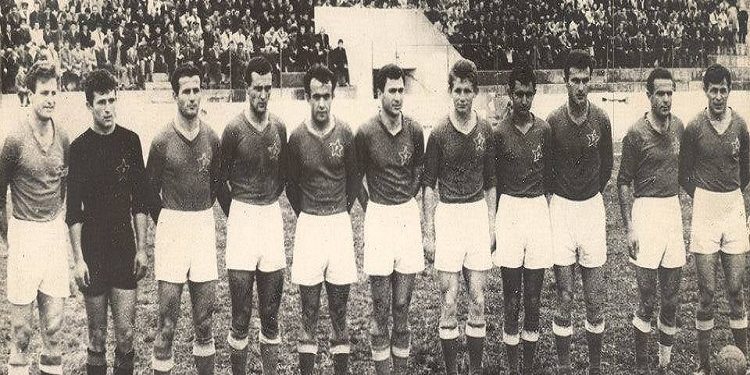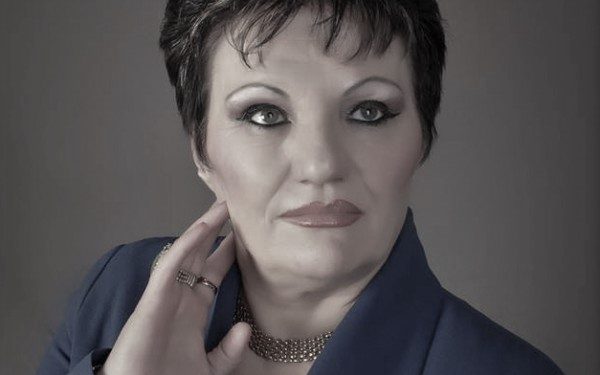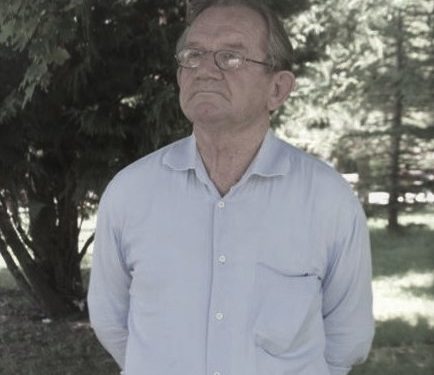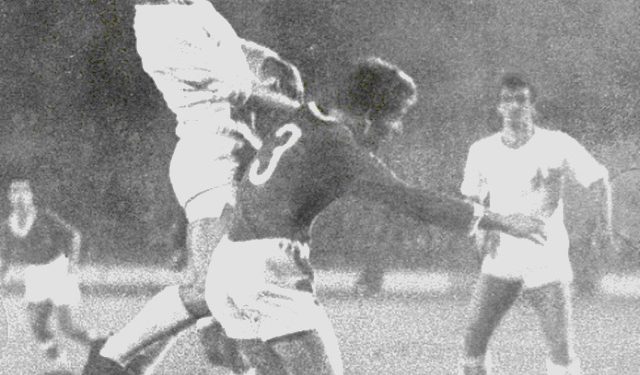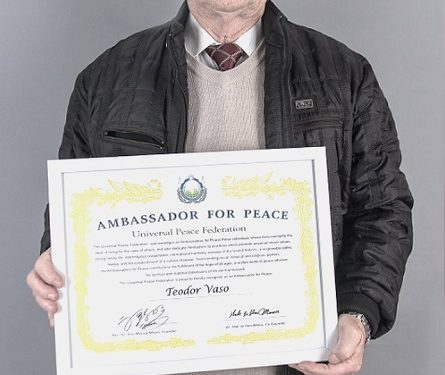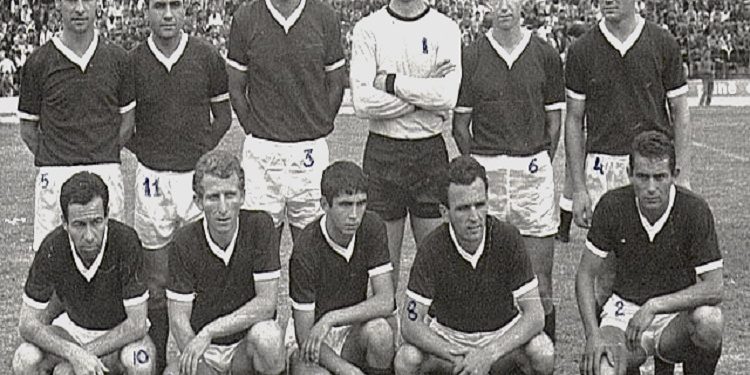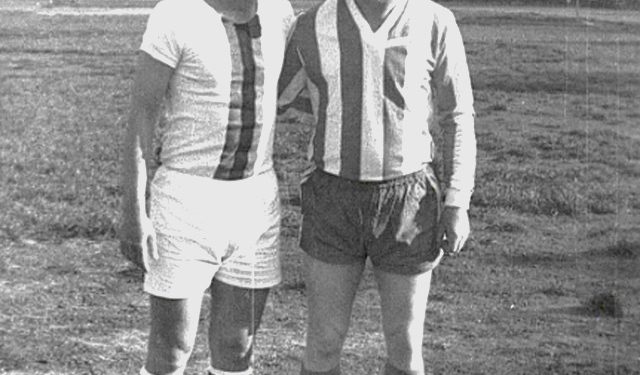First Part
Memorie.al / Who wouldn’t want to return to those years of the last century, to recall the impressive and historical panorama-memory, the distinguished elite of Albanian sports, those who made the history of Albanian football, the legendary footballers and heroes of their time, who, with intelligence, passion, talent, and professionalism, managed to write history at the national, European, and global levels. Some of them rest in eternal peace, some are still here today – noble and proud, idols and legends – they are and will remain major figures, not only for the generation they belonged to and the future, but also for those dreamers, the young athletes, who wish to emulate those who made the era! Among them is the legend, the icon of Korça and Albanian football – the unsurpassable Teodor Vaso – a dominant sports figure in national and international matches, who brought fame and history to a more professional, spectacular, historical, and mythical football of the last century!
Teodor Vaso is among the greatest Albanian footballers that the history of Albanian football has ever known, since its inception. He possesses a golden career that aligns with the astonishing biography of the unsurpassable Teodor Vaso. He was born and currently lives in the city of Korçë. He graduated from the “Vojo Kushi” Institute of Physical Culture in Tirana. He has been a continuous football coach and specialist since 1972, totaling 55 years of sports activity. In the last two years, 2012-2013, he served as an FSHF (Albanian Football Federation) delegate for matches in the Korçë district. He was a national champion with the “Partizani” team in the 1963-64 football year and winner of the Republic Cup that year and again in 1966. He was the winner of the Balkan Clubs’ Cup in 1970, specifically with “Partizani.”
He was the winner of the “5 Best Athletes of 1967” poll, as part of the National Football Team that eliminated West Germany on December 17, 1967. He holds the title “Merited Master of Sport” and was decorated with the “Gold Medal for distinguished merits in sport,” on the occasion of the 90th anniversary of the founding of the first Cultural-Sports Society in Korçë. He received a medal from the FSHF with the citation: for high achievements in football matches with the teams he played with inside and outside Albania. He was voted the “Best Footballer of the Century” for Korçë in the poll conducted for the aforementioned 90th anniversary. He has played in every position in the football formation, with the exception of the goalkeeper, in all national and international matches. He scored 26 goals while playing in defensive roles and was a representative in 36 international matches: 18 matches with the Albanian National Team, 15 matches with the “Partizani” team, and 3 with the Korça team. In this exclusive interview, Teodor Vaso narrates the football history of his life, Albanian sport, and that of many colleagues who together defined the era of Albanian football – he tells us about the light they left behind.
Mr. Vaso, first of all, thank you for this warm and friendly conversation. We are not only united by the feeling of being fellow citizens, Korça natives, 24-karat, but we were also colleagues at the “Themistokli Gërmenji” Gymnasium. This early acquaintance gave me the wonderful chance for this interview. Who is Teodor Vaso and something about your childhood?
My childhood was difficult, like all families at that time, but not one of noticeable poverty, thanks to the dedication, work, difficulties, and challenges of my parents. I remember my mother, taking me everywhere with her, especially to buy the daily bread from a bakery in the heart of Korçë. One day, that bakery was called the “Oven of Death.” This frightened me even more, and I followed my mother from behind when I still hadn’t turned 8. Queuing with the other women, in the cold, or even when the heat was scorching, I would wait for my mother across from the line of women. I could easily spot her from afar, that beautiful, kind, and noble lady, stout and strong, with her gold-colored hair. My mother endured the jostling and pushing of the human line, just to get a little bit of life in her hands.
These difficulties and sacrifices to live not only matured me morally prematurely but also strengthened me physically. I attended the “7 Nëntori” school, as it was called then, while today it is the “Sevasti Qiriazi” school. I often played football at school and other sports. I started training with a boxing team. I played volleyball constantly, and I always played in the “Little Footballer” group. The inner drive compelled me to be under the jersey and tracksuits of a team, to train. One day, I found myself on the boxing team of the well-known Professor Niko Mile. On Sundays with the boys from my alley, we held our breath in front of the wires that enclosed the ground and area where the Korçë football field was, to watch our city’s team, “Puna” of Korçë. We crawled under the wires to sneak inside and see them – the magicians of the football game.
We kept an eye on the guards, who, as soon as the match started, would sometimes go near the rows of people at the edge of the field to watch some of the game. We would then rush in. We somehow understood that they did it on purpose, acting as if they didn’t see us, giving us the chance to enter the stadium. Later, I left to study at the “7 Nëntori” Polytechnic in Tirana. After a few years, my father, who sold goods in the bazaar, went bankrupt. Two bad things came together. My father was left jobless, and my scholarship at the “7 Nëntori” Technical School in Tirana was cut. This was a measure against the merchants of the time. I returned to Korçë, near the barbed wires of the field. There, where the city ended to the north, the spirit of ambition knocked on me, the dream and unrestrained desire to resemble the players who passed before our eyes, to enter the field of play. Boriçi, Gjinali, Resmja, Fagu, S. Jareci, Q. Vogli, P. Mirashi, Teliti, seemed enormous, so great, like mountains – but mountains don’t move. They moved, laughed, greeted, scored, and played.
How did the love for sport, particularly football, come to you? Was it a family tradition, a challenge of youthful ambition, or coincidence?
With other young men my age, and also from other neighborhoods, we played football and other games in the squares or alleys of the neighborhood. Memory cannot recall the reason why I was not accepted into the youth football team in Korçë. After boxing, I started athletics. Endless energy was boiling inside me, and I had to express myself somewhere. The wave of sports activity swept me away quite by chance. From the age of 15, I was sent to work to help my family. I started working as an “apprentice” in production at the “Republika” venue. Only one wall separated it from the “Morava” cinema, today “Milenium.” I saw two men rushing through the space between the tables, and they stopped at my feet. “Are you Todo Vaso?” they asked. They were looking for runners for the local athletics championship. I competed in the 800m. Before the finish line, a sporty figure passed me in the sprint, just one step ahead of me, cutting the ribbon – the athlete Pandi Nika, and I, one step after the finish line, fell to the ground.
Lying there, that sudden fall introduced me to the two athletics coaches, Kiço Nuke and Andrea Berberi, who were surprised by the result of an adolescent who revealed a new talent. What was I supposed to do? Rejoice in the report card with maximum grades! A new dawn came into my days. I was notified that the scholarship was back, for the School of Labor Reserves in Tirana. With teacher and Coach Osman Caslli, we competed in the Tirana high school championship and were declared champions. At the Automobile Park in Tirana, where I was doing my practice, I started playing in the enterprises’ championship. Later, “Usta” Zihni Gjinali discovered me and asked me to do my training with “Dinamo.” At the end of 1957, I lined up for the first time in front of the champion coach, Gjinali, and alongside the players of the famous “Dinamo.”
What can you tell us about how you became part of the “Skënderbeu” football team?
As I detached from my youth and was considered an adult after two runner-up titles in athletic competitions and winning the championship title with the youth of “17 Nëntori – A.” The path with the adults gained a name with the scoring of the first goal, right in the first match against my own team “Dinamo,” which had allowed me to play with Tirana. The public appearance quickly spurred offers. “Dinamo,” my first “owner,” “17 Nëntori,” which had formalized my first registration, and “Skënderbeu,” which was surprised to see one of their athletes playing in the “17 Nëntori” formation with the adults at the “Qemal Stafa” stadium, during the First National Spartakiad in October 1959.
They proposed conditions for me to continue my career with their teams. Two incentives stirred my soul: Family, which was waiting with open arms for help from the young mechanic son with the diploma in his pocket. Along with it, the great worry that had troubled me for a long time: the voice of my city was calling me. At the “Qemal Stafa” stadium, the “Dinamo” – “Skënderbeu” match ended 1-0. The goal was scored by “Dinamo” with an 11-meter penalty (a penalty kick) that was nowhere to be seen on the field, but only in the mind of the referee, Izet Cani. The scandal ended with the annulment of the match, which, upon repetition, “Dinamo” won 5-0. This led me to return to Korçë.
The “Skënderbeu” team was declared champion in 1933. What can you tell us about the history of the Korça team? When was it founded and who were its first players?
The first sports society in Albania, which was also created with a cultural character, undisputed to this day, is the Cultural-Sports Society “Vëllazëria”, dated 14.04.1909 in Korçë. The second society is “Vllaznia,” dated 16.02.1919; both were established by the same person, Hilë Mosi. The birth of “Skënderbeu” was not accidental. So, as I said above, and I repeat, the first team in Korçë named “Vëllazëria” was created on April 14, 1909, by Hil Mosi. After that, during the years 1920-1922, the first football societies began to be created in Korçë, such as “Përparimi” or Sport Club “Korça”; in 1917, the “Shpresa” society of the French Lyceum in Korçë was founded, while in 1925, “Skënderbeu” would come to life.
Football had become a big dream. Football was played in every home courtyard. The neighborhoods of Korçë tried to field their own teams. After “Skënderbeu,” the “Zhgaba” society was created in 1926, while in 1927, neighborhoods produced teams such as “Leka i Madh,” “Pirro,” “Brekverdhit,” “Zjarri,” “Tigri,” “Diamanti,” etc., but “Skënderbeu,” this city team, shone. Regarding football in 1913, the first documented official football match is cited, between the “Independenca” team and the Austro-Hungarian army team located in Shkodër. This fact provides an argument that the confirmed beginnings of the game of football in Albania are found in Shkodër. Here is also an interpretation from the most famous sports publicist and journalist in Albania, Besnik Dizdari [from Shkodër], for that time: “…1905 has been commemorated in Shkodër as the year of the birth of football in Albania.
I have always been skeptical about this year, as there is no preserved authentic document that proves it (The Book ‘History of the Championships of Albania’, 30s p.11). The written history seems to have remained deficient regarding the earliest confirmed beginnings in documentation, because the history of Shkodër football has two official dates: 1 – The first date for all of Albania, that of the development of an official match, is in 1913 (July-August). 2 – The second date is that of the formation of the first Shkodër football society, on 16.02.1909. In 1925, two other teams, “Brekëverdhit” and “Ylli i Mëngjesit,” were formed. “Skënderbeu,” after the start of the first championship in 1930, precisely in 1933, in the fourth championship, gifted Korçë its first champion title, until the distant year of 2011 had to come for such glory to be repeated.
That glorious team, upon crowning the title, featured these players: K. Marjani, T. Bimbli, A. Cani, A. Miti, L. Petra, F. Stasa, N. Dishnica, T. Ypi, TH. Vangjeli, S. Teofik Agaj, E. Kulla, V. Trebicka. Coach Qemal Omari. Teli Samsuri was missing from this formation, who was called, in the sports journalism of the time, the best of the Korça players and the best Albanian footballer of the time – the historical model center-forward, a product not only of football values. The championship came naturally through economic, social, and cultural development in relation to the situation in Albania at that time. After a fight against the club-based tendencies of the time, where Tirana visibly dominated in the history of Albanian football, the Korça team “Skënderbeu” captured one Champion title, two Runner-up titles, and placed fourth four times. It would survive the difficulties it would face, even the intrigues of politics.
Thanks to your valuable, energetic, exceptional, brilliant contribution, full of talent and professionalism, what can you tell us about some of the most important characteristics and necessary skills for professional and spectacular football? What motivated you to keep the passion for football alive?
The movement of a human body in space with a ball gains value from the synthesis of several qualities. Their value is conditioned by the ability of the human organism to respond to the demands of several constituent factors of the football game. The manner and quality of the action’s conclusion determine the value of success or failure. The qualities are: physical-technical skills and the use of the ball in time and space relative to the positioning of rivals and partner players. These are within the field of play. Before the player becomes an actor in front of the spectators, a multi-year training and teaching procedure is essential, based on the methodical-scientific implementation of the constituent elements of the football game.
The three preparations of physical, technical, and tactical qualities require masterful refinement, by exercising them on the selected element with promising initial talented predispositions, which are measurable but are selected by the natural gift that the respective specialists distinguish. The difference lies in the simultaneous application of several common actions that the player performs with virtuosity or awkwardness. These are seen in the measurement of physical qualities in ball-handling movement skills and intellectual abilities, to adapt and orient one in situations where several constituent elements of the game operate. Professional football differs from amateur football in the way the team group performs collective actions, where the coaches’ duties are respected, behavior with rivals and colleagues, demonstrating not only a masterful game but also cultured behavior that conveys education and humanism to the spectators.
Motivation is an inner mental and psychological force that engages a person to realize specific desires or goals. Initially, I played for pleasure and fun. Life led me to the Tirana youth team. The people of Tirana gave me the captain’s armband of the football team, which was crowned the Youth Champion of Albania. As I heard words of praise for my playing, before a week had passed since the joy of the championship title, I lined up with the adults of “17 Nëntori,” at a time when its new stars had emerged, such as Panajot Pano, S. Halili, F. Frashëri.
A strong light shone in my mind those days, and the words of encouragement repeated through it: you can, you can, and you can already climb higher. Other motives quickly arose. The Korça native who had just left the dormitory needed to find a basis for life. “Dinamo,” my first “owner,” “17 Nëntori,” which gave me my first starting match with the adults, and “Skënderbeu,” which did not recognize Teodor Vaso as a football player, saw that the Korça youth athlete in the 400m and 800m races was playing in the “17 Nëntori” formation for adults and demanded that I be registered with their team.
However, “Skënderbeu” was the team I couldn’t get out of my mind; it was my birthplace. Korça inspired me; my parents were waiting for me like cold water. Comments from Korçë conveyed news that talented football figures had begun to appear on the football field: A. Pilika, M. Tuxhari, V. Bicolli, V. Samarxhiu, Dh. Dhami. This community motivated me to form a block and contribute with them to the new beginning of the 1960-’70 decades. The love, respect, and interest of some Korça natives working in Tirana inspired the idea that the game of football would give me prestige, personality, and respect. “You are the son of Korçë, and with your friends, you will give perspective to the future of Korça football, whose glory was left years ago.” Football became a being within my being that drove me, motivated me, because without it, I would be alienated.
The preparation of new generations motivated me to help and contribute to the training of new generations, to whom I see that even now (2014), I have something to give. Hundreds of footballers who send me messages recall our work with the generations when we came out, within 4 years, as 3-time national youth Runner-up, and many of them: Dh. Xhambazi, M. Kërçiç, P. Tole, G. Muhaxhiri, Gj. Kushe, Bledi Shkembi, L. Tiko, P. Dhëmbi, S. Lako, G. Qose, etc. If I go below the level of the players of the national hope and youth teams, I would have to write dozens and dozens of names of the players whom I have had the pleasure of continuously training and teaching. Being active in training and in the educational process is the motivation that gives life vitality, freshness, and meaning. The mission is not only professional; it keeps you connected with the life of youth, with passing time, with what is called useful work.
Where did the strength of success lie during the peak phases of the “Skënderbeu” team against other teams that gave us the spectacular football of the ’70s?
In the history of global football teams at different stages, many teams have shown a boom of success at the level of the competitions they represented. The Korça team has had three such “booms” until today (2014). In the 1930s, “Skënderbeu” appeared magical on the fields where football was played. In 1931, the Korça players won 7-0 against Berat (“Muzaka”), in 1933, they won 9-1 against Kavaja, in 1934, and they won 5-0 in Vlorë. This is very little of the “Skënderbeu” football hurricane in those years. It took 30 years for the games of “Skënderbeu” to lift the hearts of the Korça sports fans again. After 1944 (after the war), Korça football went through difficult times. Only in 1947 and 1957 was it worthily represented. The next period had many poor results. In the period 1960-1973, “Skënderbeu” erupted again.
Its duels with the three teams from the capital were a problem mainly with the two super military clubs (“Dinamo” – “Partizani”), which, besides their potential football capacities, also had the support of their state names. Before the ’60s, Korçë might manage a draw with the two military teams and only one 1-0 victory in 1957 against “Partizani” in Korçë. Korça spectators, who had seen their city’s football in the 1930s, were thrilled again, and the constrained feeling within their being during the years of emptiness was released and surged again as before. “Skënderbeu” began to win and draw against all teams in Albanian cities. A potential ensemble was created, a fusion of the existing values of the team’s contingent and the group of new players, the new arrivals.
The Soviet coach near the FSHF, in 1960, wrote in the sports press: “It is joyful for Albanian football that many young players have emerged, such as Halili, Pano, Bushati, Frashëri, Dingu, Pilika, T. Vaso, who are a good future for your football. The two names – Pilika and T. Vaso, are Korça natives in the elite of national football, who, along with the other contingent of ‘Skënderbeu,’ have undertaken to strongly represent Korça football.” The pleasure of the sports fans to quench their thirst to defeat the contemporary masters was realized. We won against “Dinamo,” “Partizani,” and “17 Nëntori” right there in Tirana.
It was a time when Korça sports fans, which had been living with suppressed feelings, far from their dreams for years and years were liberated. The time when the three teams of Korçë, Tirana, and Shkodër crushed the teams of other districts with bombastic results over 7-0 had passed. The Tirana – Korça duels, which were once aggravated, returned. At the same time, new duels with the two military teams, “Dinamo” – “Partizani,” arose. The game of “Skënderbeu” had risen to the levels of modern contemporary football with the characteristics of Total Football, the Dutch style of the time. / Memorie.al




